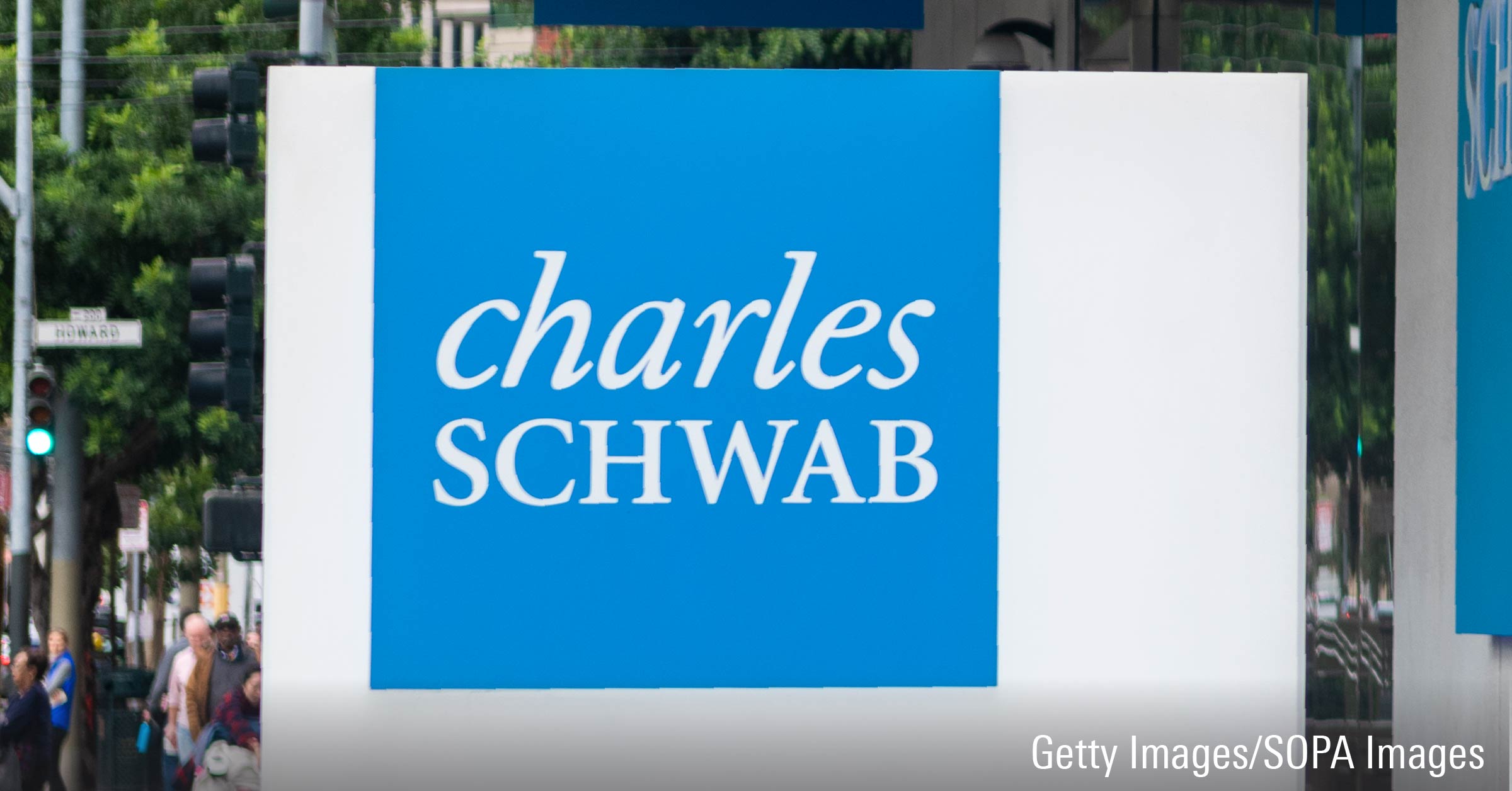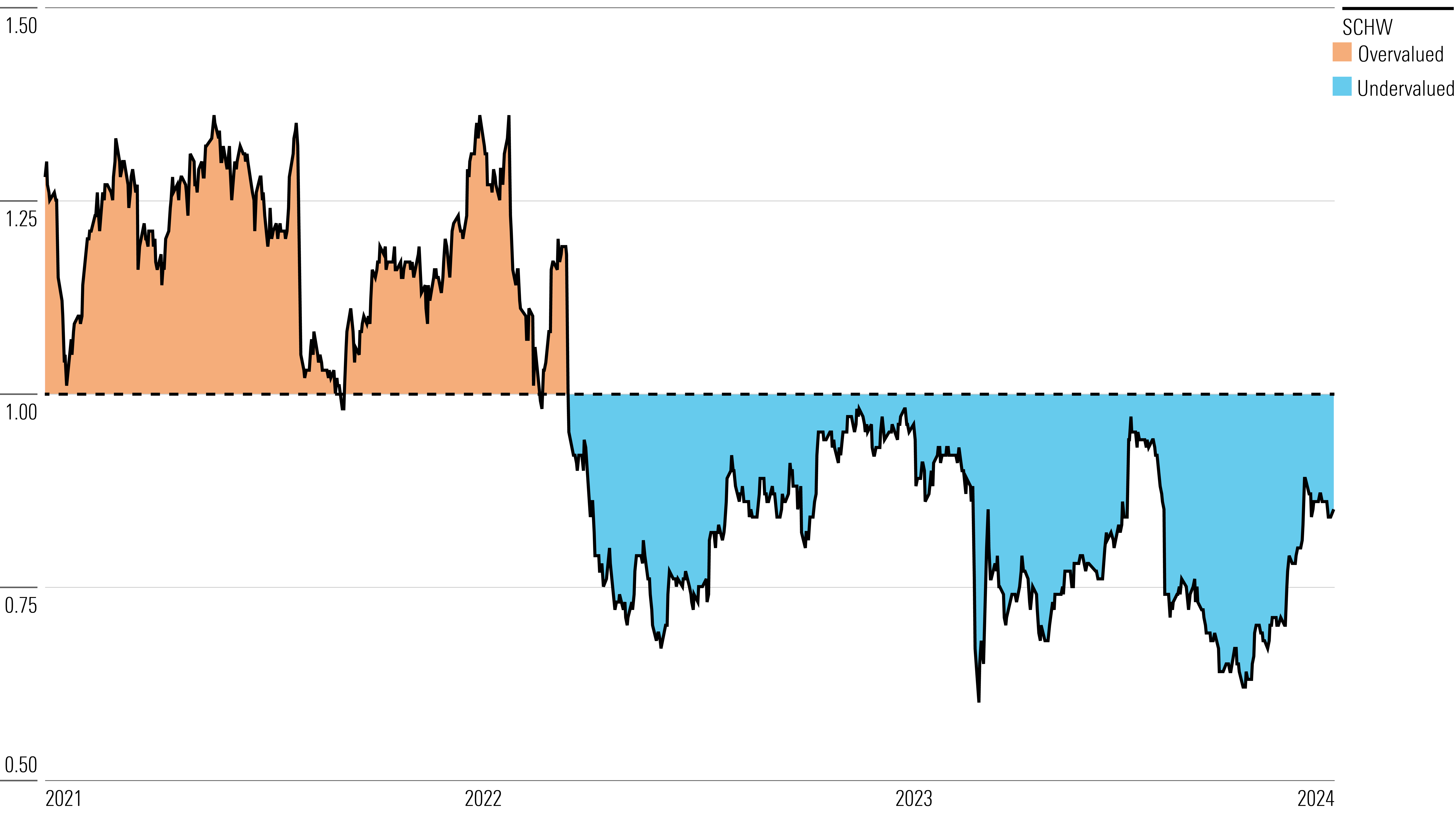Going Into Earnings, Is Charles Schwab Stock a Buy, a Sell, or Fairly Valued?
With our eye still on cash sorting, here’s what we think of Schwab’s stock.

Charles Schwab SCHW is set to release its fourth-quarter earnings report on Jan. 17, 2024, before markets open. Here’s Morningstar’s take on Schwab’s earnings and stock.
Key Morningstar Metrics for Charles Schwab
- Fair Value Estimate: $80.00
- Morningstar Rating: 3 stars
- Morningstar Economic Moat Rating: Wide
- Morningstar Uncertainty Rating: High
What to Watch for In Charles Schwab’s Q4 Earnings
- Changes in the company’s unrealized losses on securities and capital levels due to the decrease in interest rates. A good portion of the recent runup in the stock’s price was likely driven by lower interest rates and further abatement of the tail risk with the company’s capital levels.
- Management commentary on the effects of lower interest rates on income.
- Signs that “cash sorting” has further abated, along with the company’s outlook on the practice. Less sorting and paying down high-cost supplemental funding are positive for net interest income.
Charles Schwab Stock Price
Fair Value Estimate for Schwab Stock
With its 3-star rating, we believe Schwab stock is fairly valued compared with our long-term fair value estimate.
We’re increasing our fair value estimate to $80 per share from $70. This estimate implies a price/2024 earnings multiple of about 18.5 times and a price/book multiple of about 4.5 times. We made many adjustments to our prior model, with the most impactful changes being how we model regulatory capital, how much interest is paid on deposits, and our assumed deposits/client assets ratio.
In the medium term, we forecast a 7% compound annual growth rate for net revenue as trading revenue flattens, client assets increase at a 10% rate from recent bear-market lows, and deposits increase after cash-sorting headwinds subside in 2023. Much of the revenue growth is attributable to net interest income from the resumption of deposit growth and reinvesting of maturing fixed-income proceeds.
Read more about Charles Schwab’s fair value estimate.
Charles Schwab Historical Price/Fair Value Ratio

Economic Moat Rating
We award Schwab a wide economic moat. Given its massive scale and industry-leading cost efficiency, we believe the company could endure severe competitive pressures and still earn above its cost of capital. After the company’s commission pricing cut in 2019, we still forecast returns on capital in the low-to-mid-teens, well above the company’s cost of capital. In the long run, we believe returns on invested capital could even exceed 20%. We also estimate that over 20% of client assets are in either a Schwab proprietary or a controlled product, which allows the company to extract more profits on client assets than other brokerages, whose clients primarily use third-party products.
We think the company’s massive scale gives it a cost advantage that few can match. At the end of 2022, Schwab supported over $7 trillion of client assets, making it one of the largest U.S.-based companies focused on securities trading and wealth management. Its cost advantage can easily be seen with its industry-leading expenses per dollar of client assets, which is often 15 basis points or lower.
Schwab’s low costs and large client base also give it the flexibility to create products with a value proposition that is comparable or superior to that of peers and that can ramp quickly. While a relative latecomer to creating its own exchange-traded product line, it is now among the top 10 largest exchange-traded fund companies by assets. The company’s new online advisory platform will also benefit from its low cost and client reach, which will enable Schwab to be more profitable than existing players and leapfrog them in assets.
Read more about Charles Schwab’s economic moat rating.
Risk and Uncertainty
Major risks to Schwab include the future of interest rates, a decrease in deposits, and fee pressures. Interest rates are the key driver of the company’s earnings over the next several years. Due to the staggered reinvestment of its portfolio, interest rates have to remain high for that portfolio to fully reprice. In a recession with accommodative monetary policy, portions of the portfolio could be stuck at a lower rate. Even if such a recession is short-lived, long-term interest rates have been in a generally declining trend for years. Low long-term interest rates will affect Schwab’s reinvestment opportunities for much of its banking portfolio, while short-term interest rates, such as the federal-funds rate, will affect the company’s floating-rate securities.
While we currently believe that nominal long-term interest rates will eventually track back to about 4.5%, structural changes in the economies of developed countries may have permanently reset long-term interest rates lower along with the profitability of Schwab’s banking business. Asset-management revenue could also come under pressure, but it’s likely to be more from an asset mix shift to passive investment products from the company’s proprietary and Mutual Fund OneSource products, which have higher revenue yields.
Given the competitive dynamics in the investment services industry, loss of deposits, the future path of monetary policy, and the effects of the bear market, we’ve given Schwab a High Uncertainty Rating.
Read more about Charles Schwab’s risks.
SCHW Bulls Say
- Charles Schwab is solidifying its position as a leader in investment services, and it may be able to expand into other financial services.
- Merging with TD Ameritrade will come with material revenue and expense synergies that will be realized over the next couple of years.
- Schwab’s scalable and vertically integrated business model should enable it to convert an increasing percentage of revenue into earnings and be in the better parts of the value chain as the investment services industry evolves.
SCHW Bears Say
- A loss of deposits and higher funding costs are potential near-term negatives for the firm.
- While Schwab has the resources to adapt, fintech innovation has increased in recent years and could disrupt parts of the investment services industry. Zero-dollar-commission business models and robo-advisors are recent trends that have challenged the status quo.
- A Europe- or Japan-like scenario of near-0% interest rates for an extended period would significantly reduce earnings and likely necessitate a change in business model. The Federal Reserve may have to lower interest rates if a recession occurs.
This article was compiled by Quinn Rennell.
The author or authors do not own shares in any securities mentioned in this article. Find out about Morningstar’s editorial policies.

/s3.amazonaws.com/arc-authors/morningstar/75bbf764-3b6f-4f5a-8675-8f9488c74c04.jpg)
/cloudfront-us-east-1.images.arcpublishing.com/morningstar/347BSP2KJNBCLKVD7DGXSFLDLU.jpg)
/cloudfront-us-east-1.images.arcpublishing.com/morningstar/TP6GAISC4JE65KVOI3YEE34HGU.jpg)
/d10o6nnig0wrdw.cloudfront.net/04-29-2024/t_d0e8253d77de4af9ae68caf7e502e1bf_name_file_960x540_1600_v4_.jpg)
:quality(80)/s3.amazonaws.com/arc-authors/morningstar/75bbf764-3b6f-4f5a-8675-8f9488c74c04.jpg)